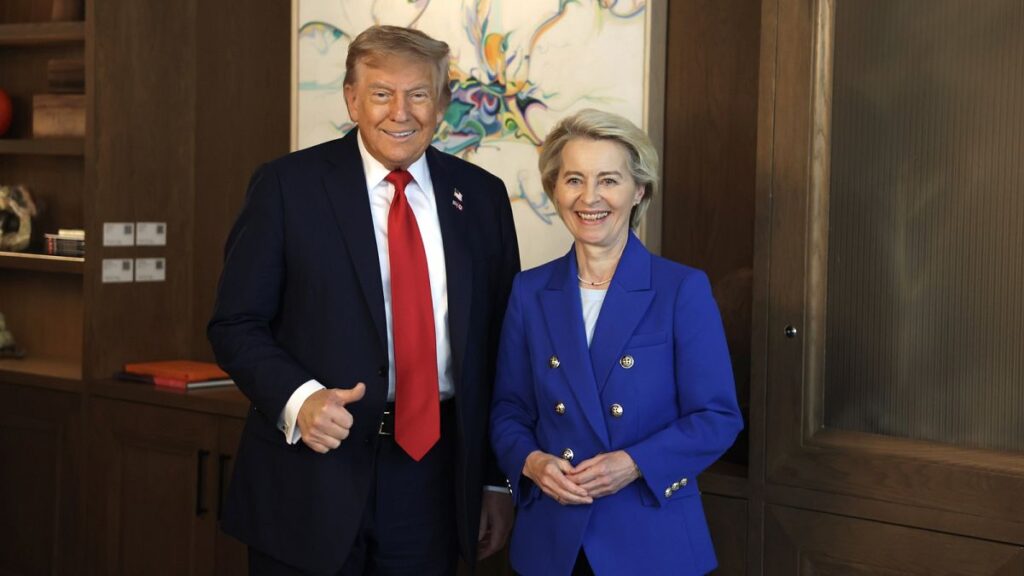Ursula von der Leyen used her participation at the G7 summit in Kananaskis, Canada, to warn against a “new China shock” and denounce Beijing for perpetuating what she called a “pattern of dominance, dependency and blackmail” vis-à-vis its trading partners, in language seemingly designed to appeal to Donald Trump’s agenda.
China holds a quasi-monopolistic position over so-called rare earths, the 17 metallic elements that are crucial for advanced technologies. The country commands roughly 60% of the world’s supply and 90% of the processing and refining capacity.
“China is using this quasi-monopoly not only as a bargaining chip, but also weaponising it to undermine competitors in key industries,” the president of the European Commission said during one of the meeting’s thematic sessions.
“We all witnessed the cost and consequences of China’s coercion through export restrictions,” she added, referring to Beijing’s recent decision to curb sales of seven types of rare earth minerals, a situation Brussels had described as “alarming”.
The move was a response to Trump’s sweeping tariffs, which caused a rapid escalation of tit-for-tat measures with China. Last week, the two sides announced a detente meant to bring down the spiralling duties and ease the export restrictions.
“Relationship [with China] is excellent!” Trump said.
But on Monday, von der Leyen sought to tap into the US-China rivalry to make the case for a “united” G7 front to counter Beijing’s dominance with an “alternative network of trusted suppliers” and fresh investments in extraction and refining.
“Even if there are signals that China may loosen its restrictions, the threat remains. But there are other distortions. We are seeing a new ‘China shock’,” she said.
“A common G7 response increases our leverage – pressuring China to take more responsibility for the impact of its state-led growth model.”
Von der Leyen also blasted China for flooding global markets with “subsidised overcapacity that its market cannot absorb”, name-checking the dispute over China-made electric vehicles that her Commission considers to be artificially cheaper.
During another session at the summit, von der Leyen went further and declared that the source of “the biggest collective problem” in the global trading system dated back to China’s accession to the World Trade Organization (WTO) in 2001.
Beijing’s entry into the WTO has been controversial, as it opened international markets to the mass production of low-cost exports. The admission is linked to the first “China shock” and a decline in manufacturing jobs in both Europe and the US.
“China still defines itself as a developing country. This cannot be. China has largely shown that it unwillingness to live within the constraints of the rules-based international system,” von der Leyen said.
“While others opened their market, China focused (on) undercutting intellectual property protections, massive subsidies with the aim to dominate global manufacturing and supply chains,” she went on. “This is not market competition – it is distortion with intent.”
Looming deadline
Von der Leyen’s hard-line approach echoes many of the grievances voiced by the Trump administration, which is bent on curbing China’s rise as an economic superpower and bringing back manufacturing jobs of strategic importance. It also tampers down growing speculation of a EU-China reset ahead of a bilateral summit in late July.
Von der Leyen’s interventions were peppered with direct appeals to Trump, who was also present in the room, even if he left the summit one day earlier due to the military escalation between Israel and Iran.
“Donald is right – there is a serious problem,” she said, referring to China.
In the immediate weeks following Trump’s inauguration, von der Leyen and her team struggled to establish an open line to the White House, causing alarm in Brussels due to his disruptive positions on Russia, Ukraine, Greenland and the Middle East.
Trump’s self-styled “reciprocal tariffs” in early April opened a 90-day window of opportunity to strike a EU-US trade deal and yielded the long-awaited phone call between the two leaders, in which they agreed to fast-track negotiations.
Still, talks are believed to be riddled with stark divergence and have made limited progress ahead of the 9 July deadline. Officials in the Trump administration have suggested the cut-off date might slip to allow greater space for negotiations.
“On trade, we instructed the teams to accelerate their work to strike a good and fair deal,” von der Leyen said on social media alongside a picture with Trump.
“Let’s get it done.”
Read the full article here

